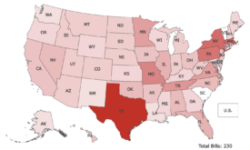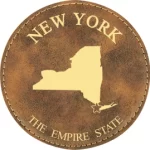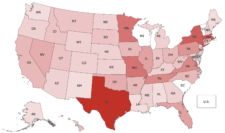 This story was originally published on Sept. 25 and was updated on Oct. 3. New material is italicized.
This story was originally published on Sept. 25 and was updated on Oct. 3. New material is italicized.
Last month, we reported that through the end of the summer there were no states that had approved legislation significantly altering their public notice laws. We were wrong.
Unbeknownst to most in the newspaper business, two months earlier Ohio Gov. Mike DeWine had signed into law measures buried within the legislature’s 6,198-page budget bill that will bring sweeping changes to the state’s public notice regime. DeWine signed the bill less than a week after it passed both the GOP-dominated state House and Senate by wide margins on June 30.
Public notice picture coming into focus
 With only eight state legislatures still in session the legislative die for 2023 has largely been cast. There’s always a chance that one of those states could still make mischief, but when the calendar turns to Dec. 31 it’s likely we’ll be able to say it was a pretty good year for public notice.
With only eight state legislatures still in session the legislative die for 2023 has largely been cast. There’s always a chance that one of those states could still make mischief, but when the calendar turns to Dec. 31 it’s likely we’ll be able to say it was a pretty good year for public notice.
PNRC has been tracking approximately 230 bills introduced this year that have at least a minimal connection to public notice law. Forty-eight have been signed into law. Of those 48 bills, 13 will probably have a slightly negative effect on government transparency while the impact of about 20 others will be moderately positive. The remainder will have little to no substantive effect.
AG supports newspaper notice in Wyoming lawsuit
 Two municipalities in Wyoming passed nearly identical ordinances in 2021 exempting themselves from state statutes mandating the publication of various notices in their local paper of record. A lawsuit subsequently filed by that paper — Lee Enterprise’s Casper Star-Tribune — seeks to compel the cities of Mills and Bar Nunn to publish those notices within its pages.
Two municipalities in Wyoming passed nearly identical ordinances in 2021 exempting themselves from state statutes mandating the publication of various notices in their local paper of record. A lawsuit subsequently filed by that paper — Lee Enterprise’s Casper Star-Tribune — seeks to compel the cities of Mills and Bar Nunn to publish those notices within its pages.
The Star-Tribune is the official newspaper of Natrona County. Mills and Bar Nunn are small but growing communities within the county.
Last month, the state of Wyoming weighed in on the side of the Star-Tribune. The attorney general’s office filed a brief in the case, arguing the state’s public notice laws are valid and must be followed by both local governments.
Is New York the Wild West of public notice?
 The New York Times reported last month on several incidents in which public officials revoked public notice contracts “in an effort to punish their hometown newspapers for aggressive coverage of local politics.” The story included two recent cases in New York state.
The New York Times reported last month on several incidents in which public officials revoked public notice contracts “in an effort to punish their hometown newspapers for aggressive coverage of local politics.” The story included two recent cases in New York state.
New York isn’t the only place where public officials sometimes seek to retaliate against those they perceive as enemies. But the state’s folkways and traditions, along with its arcane and antiquated public notice statutes, often result in the chaotic administration of the law.
Pennsylvania reporter wins public notice reporting award
 It was bound to happen again.
It was bound to happen again.
Jim Lockwood (pictured on left), a reporter for the Times-Tribune in Scranton, Pa., has been named the 2023 winner of PNRC’s Michael Kramer Public Notice Journalism Award.
The award was announced yesterday as part of the National Newspaper Association Foundation’s 2023 Better Newspaper Editorial Contest. Lockwood previously won the prize in 2015 and came in second place, or tied for second, every year since then except 2022.
The award is given annually to the best reporting that uses public notice as a primary source of information.
Louisiana begins transition to newspaper websites
 Last week, Louisiana became the first state to pass a law that will eventually make newspaper websites the primary platform for public notice. HB-650 requires local governments to post their notices on official newspaper websites beginning in 2027. They’ll also be required to publish print notices describing the subject matter and location of the online notices, but — in a reversal of present custom — the print ads will be free and the online notices will be the ads they pay for.
Last week, Louisiana became the first state to pass a law that will eventually make newspaper websites the primary platform for public notice. HB-650 requires local governments to post their notices on official newspaper websites beginning in 2027. They’ll also be required to publish print notices describing the subject matter and location of the online notices, but — in a reversal of present custom — the print ads will be free and the online notices will be the ads they pay for.
HB-650 passed both houses unanimously and is expected to be signed by Gov. Jon Bel Edwards when it reaches his desk.
Few local governments in South Dakota use state portal to post public information
 Jackson County government officials don’t post public information on the internet.
Jackson County government officials don’t post public information on the internet.
The rural western South Dakota county, which serves roughly 2,800 residents spread over 1,871 square miles, doesn’t have a website.
And it doesn’t intend to, County Auditor Vicki Wilson said.
“It takes more time than we have staff,” she said.
State government offers a potential solution, but Jackson County isn’t using it. Nor are most other South Dakota counties, cities or other local governments.
It’s a website created by the Gov. Kristi Noem administration in 2021 where local governments can voluntarily upload their meeting notices, agendas and minutes, without having to manage their own website.
Don’t hide your online notices!
 Most newspapers now publish notices on their website in addition to print, even in states that don’t require it. As we’ve written before, it’s one of the most important things publishers can do to help their state’s press association protect newspaper notice.
Most newspapers now publish notices on their website in addition to print, even in states that don’t require it. As we’ve written before, it’s one of the most important things publishers can do to help their state’s press association protect newspaper notice.
However, too many publishers still make it difficult for users to find the notices that are posted on their website. Last week we spotted a perfect illustration of the phenomenon.
The Westerly Sun published an editorial (“In defense of legal notices”) arguing against legislation that has been introduced in Rhode Island’s General Assembly that would allow local governments to publish notices on their websites in lieu of print newspapers. A website visitor quickly added a helpful suggestion in the comments section below the article.
Several eligibility and self-storage bills advance
 It’s the time of year when many states have either ended their legislative sessions or are preparing to adjourn sine die in the next month or so. We’ve also passed the point in most states when new bills can be introduced or existing legislation that hasn’t passed out of the body in which it was introduced can be considered in the opposite chamber.
It’s the time of year when many states have either ended their legislative sessions or are preparing to adjourn sine die in the next month or so. We’ve also passed the point in most states when new bills can be introduced or existing legislation that hasn’t passed out of the body in which it was introduced can be considered in the opposite chamber.
Nevertheless, several noteworthy public notice-related bills we’ve been following did see some movement last month.
Most importantly, bills in Arizona and Iowa authorizing local governments to publish notices on government websites instead of newspapers were significantly amended before they passed their original chambers.
About those Disney notices …
 You may have heard that the Walt Disney Co. recently took steps to frustrate Florida Gov. Ron DeSantis’ attempt to strip the entertainment conglomerate of its power to appoint members of the board that provides oversight for Disney World.
You may have heard that the Walt Disney Co. recently took steps to frustrate Florida Gov. Ron DeSantis’ attempt to strip the entertainment conglomerate of its power to appoint members of the board that provides oversight for Disney World.
According to a story published last week in the New York Times, the Disney-appointed Reedy Creek Improvement District (RCID) Board of Supervisors “quietly pushed through a development agreement” preventing the governor from replacing them with his allies, thereby maintaining Disney’s governance of the world’s largest theme park. The Board proposed the agreement at a public meeting on Jan. 25 and approved it at a follow-up meeting on Feb. 8.
Trends emerge in public notice bills
 It used to be a relatively rare event when a bill remedying errors or omissions in public notice advertising was introduced. Or when legislation authorizing newspaper websites or e-editions to substitute for print was proposed. But those types of measures have proliferated in 2023, along with bills designed to fill jurisdictional holes in news deserts, which have been picking up steam for a few years now.
It used to be a relatively rare event when a bill remedying errors or omissions in public notice advertising was introduced. Or when legislation authorizing newspaper websites or e-editions to substitute for print was proposed. But those types of measures have proliferated in 2023, along with bills designed to fill jurisdictional holes in news deserts, which have been picking up steam for a few years now.
